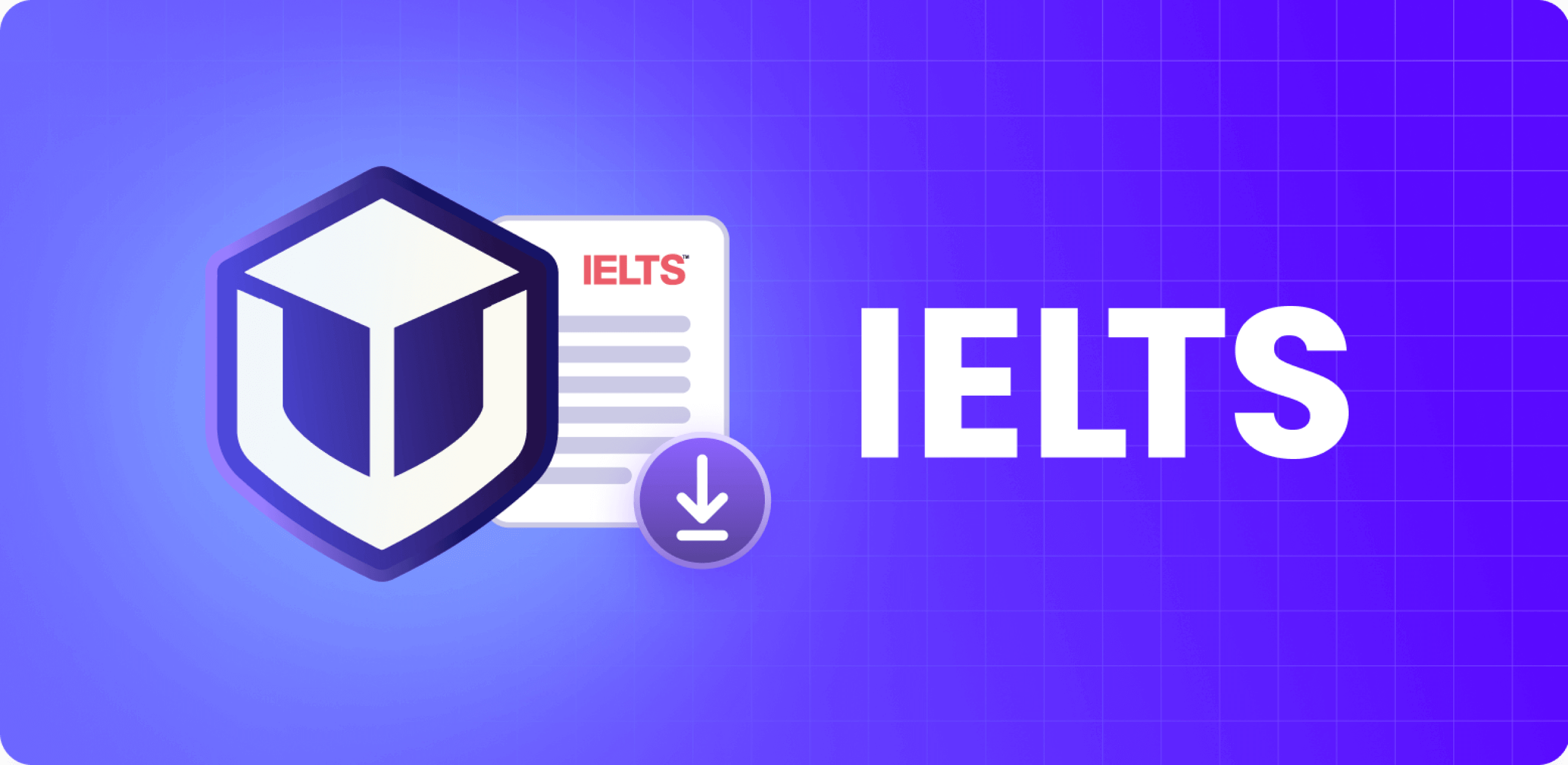Are you aware that a single mistake in the IELTS Listening test can result in zero marks for an answer? Even if you hear the word correctly, but misspell it can cost you the point.
For many Indian students, the challenge is not just understanding accents, it is connecting what they hear to the correct spelling. That’s where dictation words become your secret tool to improve your score.
This guide goes beyond random lists. We have categorized over 1,200 high-frequency dictation words by linguistic patterns (like silent letters) and exam sections (Academic vs. General). This method helps you practice strategically and prepare for your study abroad goals.
How Dictation Words for IELTS Listening Affect Your Band Score
The IELTS Listening test has 40 questions. To reach Band 7+, often required for top universities in the UK, USA, and Canada, you need at least 30 correct answers.
Dictation exercises train three critical skills:
- Auditory Decoding: Break down fast speech into individual words.
- Orthographic Output: Recall correct spelling under time pressure.
- Contextual Clues: Identify the correct word in context, e.g., “principal” (head of school) vs. “principle” (truth).
Mentor Tip: Don’t just read the lists. Practice actively to recognize words instantly, even in Australian or British accents.
The “Running Dictation” Method: Ways to Practice
Passive reading alone will not improve your score. Running Dictation is an active learning technique that combines movement, memory, and writing to improve retention and spelling accuracy. It trains your brain to listen, remember, and write words correctly under time pressure, simulating real exam conditions.
How it works:
- Set up: Place your word lists across the room or on a printed sheet.
- The Run: Walk to the list, memorize 3–5 words at a time.
- Retention: Walk back to your desk while holding the words in short-term memory.
- The Output: Write the words down exactly, focusing on correct spelling.
- Check: Immediately verify your writing against the list to correct mistakes.
This method forces your brain to process words actively, improving both listening and writing accuracy faster than passive reading or rote memorization.
Category 1: The “Silent Letter” Trap
Best for: Avoiding common spelling errors.
Silent letters appear in words but are not pronounced, making them tricky for many IELTS test-takers. Mastering them prevents small mistakes that can cost points in the Listening test.
Why do silent letters matter in IELTS Listening?
Indian learners often struggle because most Indian languages are phonetic, that is you write exactly what you hear. In English, however, letters like the “b” in debt or the “p” in psychology are silent, and IELTS tests your ability to spell words correctly despite these quirks.

Get a Free IELTS Vocabulary Cheatsheet
With 350+ words you should know for a 7+ IELTS band score.
Tips to master silent letters:
- Visual memorization: Picture the spelling in your mind while listening.
- Group practice: Focus on patterns (Silent B, Silent P, Silent H, etc.) rather than random words.
- Active dictation drills: Write words aloud after hearing them to reinforce correct spelling.
Key takeaway: Silent letters are a high-risk category for Indian students, but consistent, focused practice can turn these traps into scoring opportunities, helping you reach Band 7+ in Listening.
| Silent Letter | High-Frequency Words | Common Error (Avoid This) | Context Note |
| Silent ‘N’ | Environment, Government, Autumn, Column, Solemn | Enviroment, Autum | “Environment” is one of the most frequently misspelled words in IELTS. |
| Silent ‘B’ | Debt, Doubt, Subtle, Thumb, Climb, Plumber | Det, Dout, Sutle | The ‘b’ is silent. Visualize the spelling while practicing. |
| Silent ‘P’ | Psychology, Psychiatry, Receipt, Cupboard, Pseudo | Sycology, Receit | Academic subjects like Psychology often appear in Section 3. |
| Silent ‘H’ | Honest, Hour, Heir, Honour, Vehicle, Ghost | Onest, Vicle | “Vehicle” and “Exhibition” are common in Section 2 (Travel/Tourism). |
| Silent ‘U’ | Circuit, Building, Guide, Guest, Biscuit, Guarantee | Cerkit, Bilding | “Guarantee” is a high-value trap word due to the ‘ua’ vowel string. |
Category 2: Homophones (Confusing Words)
Best for: Accuracy in context.
Homophones are words that sound identical but have different meanings and spellings. Mastering them ensures you choose the correct word in the IELTS Listening test, which is essential for a high band score.
Why homophones matter in IELTS Listening?
The exam often tests whether you can understand words in context, not just recognize sounds. Confusing words like “principal” (head of school) and “principle” (truth) can cost you points if you write the wrong spelling.
Tips to master homophones:
- Focus on context clues: Listen carefully to the sentence to understand the meaning before writing.
- Practice regularly: Use word pairs from Sections 1–4 to familiarize yourself with commonly tested homophones.
- Active writing drills: Write each homophone in sentences to reinforce correct usage.
Key takeaway: Indian students often find homophones tricky due to phonetic differences in their native languages. Consistent practice helps bridge the gap between listening comprehension and accurate spelling, improving both Band 7+ chances and overall IELTS performance.
| Word Pair | Meaning A / Meaning B | Contextual Example for Dictation |
| Principal / Principle | Head of school / Fundamental truth | “The Principal explained the school’s principles.” |
| Stationary / Stationery | Not moving / Writing materials | “The car was stationary.” / “I bought pens at the stationery shop.” |
| Council / Counsel | Advisory body / Advice | “The city council sought legal counsel.” |
| Draft / Draught | Plan or sketch / Wind (UK) | “First draft of the essay.” / “A cold drought came from the window.” |
| Accept / Except | To receive / To exclude | “I accept the award.” / “Everyone went except John.” |
Category 3: Academic & Professional Vocabulary
Best for: Sections 3 and 4 (the most difficult sections).
These sections feature academic lectures, seminars, or professional discussions. Knowing this vocabulary helps you understand complex ideas and write answers accurately in IELTS Listening.
Why is this vocabulary important?
Indian students often find these sections challenging because the words are topic-specific and uncommon in daily conversation.
Mastering terms related to education, business, science, and the environment, like dissertation, curriculum, hypothesis, biodiversity, ecosystem, and sustainability, ensures you can follow the speaker and spell answers correctly under exam pressure.
Tips to master academic and professional vocabulary:
- Focus on high-frequency terms: Prioritize words like faculty, assignment, analysis, emissions, renewable, and finance that appear often in Sections 3 and 4.
- Practice in context: Listen to lectures or podcasts on academic topics and note unfamiliar words.
- Active writing exercises: Use these words in sentences to reinforce spelling and understanding.
Key takeaway: Regular exposure to academic and professional vocabulary, including words like laboratory, grant, revenue, and curriculum, boosts comprehension in the toughest IELTS Listening sections. This helps you aim for Band 7+ while preparing for study abroad in the UK, USA, or Australia.
Category 4: General Survival Vocabulary
Best for: Sections 1 and 2 (everyday situations).
These sections usually feature phone calls, bookings, travel arrangements, and daily activities. Mastering this IELTS vocabulary helps you catch every word and spell it correctly under exam conditions.
Why is this vocabulary important?
Indian students often struggle with these words because they appear in fast, natural speech. Words like itinerary, commuter, departure, passenger, platform, shuttle, ferry, and coach are common, and knowing them ensures you don’t lose points on seemingly simple questions.
Tips to master general survival vocabulary:
- Focus on practical words: Include terms like hiking, excursion, mineral bath, scuba diving, fortnight, and millennium in your practice.
- Listen and write: Use recordings or podcasts simulating everyday conversations to identify and spell these words accurately.
- Active usage: Write sentences or short notes using these words to reinforce spelling and understanding.
Key takeaway: Consistent practice with general survival vocabulary, including high-frequency travel, transport, and everyday words, helps you secure points in Sections 1 and 2, boosting your overall IELTS Listening Band and preparing you for real-life situations abroad.
Proven Strategies to Improve Your Listening Score
Step one: Improving your vocabulary lays the foundation for a higher IELTS Listening score. Combining word practice with active listening builds confidence and accuracy. Key steps to follow to improve your listening score in your IELTS exam are:
1. Diversify Your Listening Materials
Don’t rely solely on practice tests. Listen to BBC News, TED Talks, or podcasts on science, history, or current affairs. Exposure to different accents and speeds trains your ear for real exam conditions.
2. Predict and Anticipate
Before the audio starts, read the questions carefully. Try to predict what kind of word fits each gap, such as a noun, number, or verb. This helps you focus while listening and reduces mistakes.
3. Use the Shadowing Technique
Listen to a short clip and immediately repeat it, mimicking the speaker’s intonation and pronunciation. This connects your listening comprehension to your speaking ability and reinforces memory.
4. Practice with Official Resources
Always use materials from the official IELTS website or trusted partners. This ensures your practice matches the difficulty level and format of the real exam.
Key takeaway: Combining vocabulary practice with active listening strategies strengthens comprehension, spelling accuracy, and timing, helping you secure Band 7+ in IELTS Listening.
Conclusion
Mastering dictation words for IELTS Listening practice is more than memorization, it trains your ear to catch details and your hand to spell words accurately under exam pressure.
By focusing on high-risk categories like silent letters, homophones, and academic vocabulary, and using active practice methods like Running Dictation, you can improve your accuracy and push your score from Band 6 to Band 7+.
Create a daily routine combining vocabulary drills, listening practice, and active writing exercises. Track your errors, review consistently, and simulate real exam conditions to strengthen retention.
If you want personalized guidance on IELTS preparation or help shortlisting universities in the UK, USA, or Canada, [Book a Free Counselling Session with Leap Scholar Today] to get expert advice tailored for Indian students aiming for study abroad success.
Frequently Asked Questions
Q. Which dictation words are most commonly misspelled in IELTS Listening?
Ans: Words with silent letters are the most commonly misspelled. Examples include Environment (silent n), Government (silent n), Psychology (silent p), and Wednesday (silent d). Practice writing these words actively rather than just reading them to improve spelling accuracy and secure higher scores.
Q. How many words do I need to learn for IELTS Listening?
Ans: While there’s no fixed number, learning around 1,200 high-frequency words covers most scenarios. Focus on academic vocabulary (Sections 3 & 4) and survival English (Sections 1 & 2) to strengthen comprehension and accuracy.
Q. Can I use American spelling in the IELTS Listening test?
Ans: Yes, both British and American spellings are accepted (e.g., “Color” or “Colour”). However, pick one style and use it consistently throughout the test to avoid confusion or lost marks.
Q. How can I improve my spelling for dictation words?
Ans: Use the Running Dictation method: read a phrase, walk to another room, and write it from memory. Maintain a personal error log to track frequently misspelled words and reinforce learning for Band 7+ results.
Q. Is the IELTS Listening test the same for Academic and General Training?
Ans: Yes. The Listening section is identical for both IELTS Academic and General Training. All candidates face the same four sections, including the challenging academic lectures in Section 4.
















Have Questions? Get Guidance to reach your Dream University
Connect with India's finest counsellors and biggest study abroad community.
Get Guidance